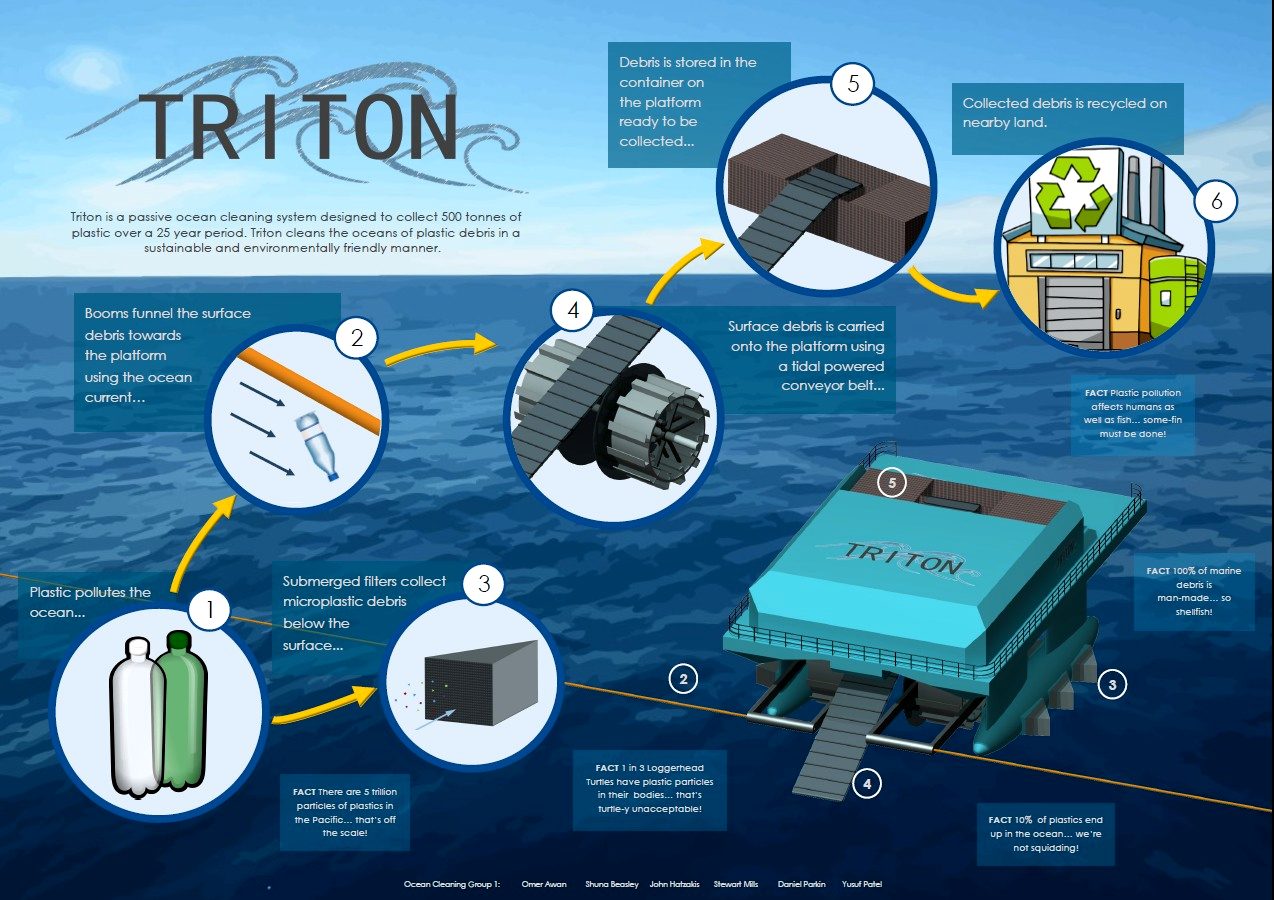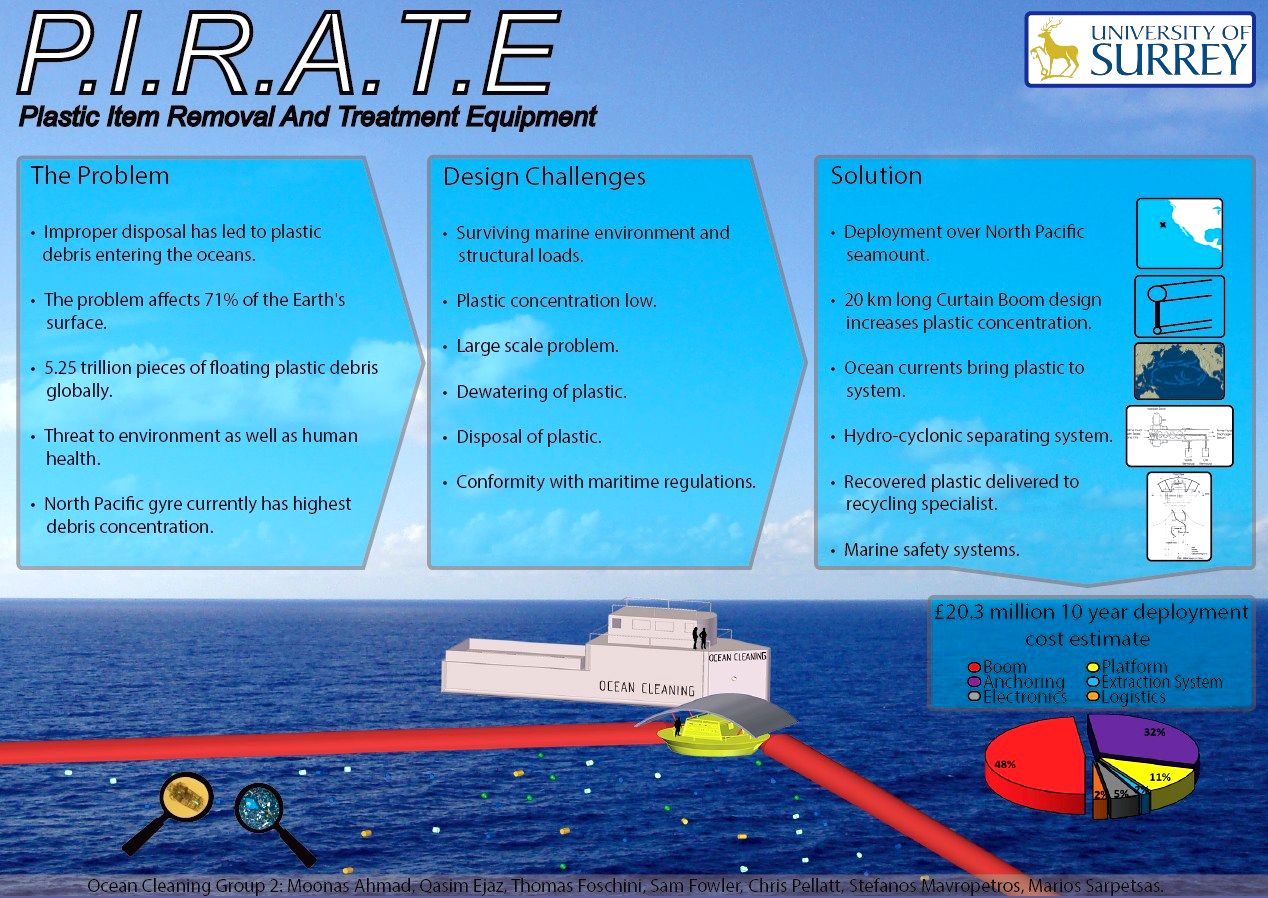|
SURREY UNIVERSITY OCEAN PLASTICS CLEANING
PLEASE USE OUR A-Z INDEX TO NAVIGATE THIS SITE
|
|
OCEAN
CLEANING GROUP 1
- Triton is a passive ocean cleaning system designed to collect 500 tonnes of plastic over a 25 year period. The system is designed to clean the oceans of plastic debris in a sustainable and environmentally friendly manner.
Group one came up with a system using floating booms to funnel the surface debris towards
a treatment and storage platform using the ocean currents. Surface debris is carried onto the platform using a conveyor belt, Submerged filters collect microplastic debris below the
ocean surface.
SURREY UNIVERSITY 2014/15 BACKGROUND
Choose a specific location for the cleanup operation or design a generic system that can be deployed anywhere. Investigate and define deployment and
maintenance methods to be used. Provide a project plan taking into account time required to design, procure, manufacture, install and commission the system. Define the funding
methods for the project.
The
suggested skills needed to complete these projects included: Electronic Engineering,
Mechanical Engineering and Chemical Engineering. We would also have added
Marine Biology, where there appears to be little reference to protecting
wildlife from accidental ingestion. We imagine that this was part of the
project even if it was not written up.
OCEAN CLEANING GROUP 2 - Their solution was PIRATE: Plastic Item Removal and Treatment Equipment to be deployed over the North Pacific seamount. It entailed the use of a 20 kilometer long boom designed to increase plastic concentration using ocean currents to bring plastic to the system. They would then separate the plastic using a hydrocyclonic filtration system. Finally delivering the recycled plastic to a recycling specialist. The system would cost £23.3 million pounds for a 10 year deployment.
THE
MDDP GROUPS Two groups tackled the problem in different ways.
GROUP 1 consisted of: Omer Awan,
Shuna Beasley, John Hatzokis, Stewart Mills, Daniel Parkin and Yusuf Patel.
GROUP 2 team were: Moonas Ahmad, Qasim Ejaz, Thomas, Fochini, Sam, Fowler, Chris Pellat, Stefano Mavropetros and Marious Sarpetas.
Group 1 went for a system they named: Triton. Group 2 favoured a floating boom system similar to that originally envisaged by Boyan Slat for his Ocean Cleanup Project.
GROUP
2
- Surrey University Triton project team
GROUP
1
- Surrey University PIRATE project team.
CONTACTS
..
REFERENCES
OCEAN CLEANUP PROJECTS
* Adidas * Algalita research foundation * Aliance to end Plastic Waste * Boyan Slat's ocean booms * LEGO Eagle Tech Titans, micro plastic robot, Texas * 4Ocean recycled plastic bracelets * Plastic Oceans Canada * Plastic Oceans Org * Seabin * SeaVax autonomous drones * Surrey University PIRATE & Triton
LINKS & REFERENCE
http://personal.ee.surrey.ac.uk/Personal/R.Webb/MDDP/2014/OceanCleaning.html http://www.surrey.ac.uk/
|
|
|
ABS - BIOMAGNIFICATION - CANCER - CARRIER BAGS - COTTON BUDS - DDT - FISHING NETS HEAVY METALS - MARINE LITTER - MICROBEADS - MICRO PLASTICS - NYLON - OCEAN GYRES - OCEAN WASTE PACKAGING - PCBS - PET - PLASTIC - PLASTICS - POLYCARBONATE - POLYSTYRENE - POLYPROPYLENE - POLYTHENE - POPS PVC - SHOES - SINGLE USE - SOUP - STRAWS - WATER
PLEASE USE OUR A-Z INDEX TO NAVIGATE THIS SITE
|
|
|
This website is provided on a free basis as a public information service. copyright © Cleaner Oceans Foundation Ltd (COFL) (Company No: 4674774) 2019. Solar Studios, BN271RF, United Kingdom. COFL is a company without share capital.
|

